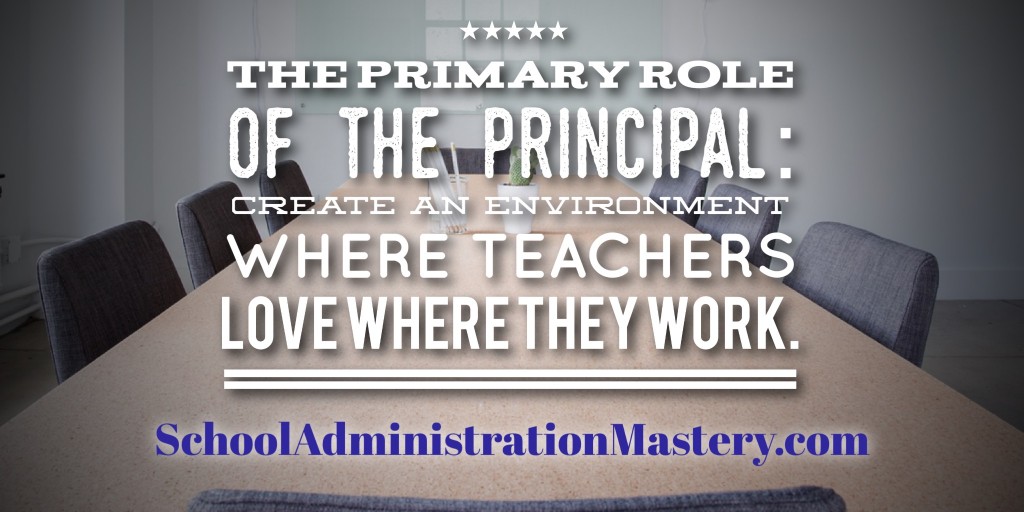In a few days, I’ll be interviewing for a position as Principal in my district. It’s a pretty big step for me, and I’m excited about the possibilities.
I’m beginning to consider the possible questions that I’ll be asked, and one question in particular comes to mind – at least it’s a question that I would ask if I was on the panel.
“What do you believe is the primary role of the school principal?”
How would you answer this?
Here’s how I would answer:
I believe the primary role of a school principal is to create an environment where teachers love where they work.
On the surface, that might sound a bit cheesy or naïve, but let me try and explain what I mean.
In Simon Sinek’s book, Leaders Eat Last, he states that his research shows, “When people feel good about working at the company they will work harder for the company.”
Basically, what Simon is saying is that when people love where they work, they do their best work. In the case of education, this is extremely critical.
When teachers do their best work, amazing things happen.
You’ve seen this. When teachers are motivated and inspired, they create lessons that are creative and engaging, and kids learn. It’s a beautiful thing.
The opposite is true, as I’m sure you’ve also witnessed. When teachers are not motivated or inspired, you get the boring classes where students are disengaged, and you know when students are disengaged, bad things happen, leaving more work for the administration.
I read somewhere that 80% of workers today are dissatisfied with their job. That’s an amazing number. 80% of people are going to a job where they are not happy. I’ve been there, unfortunately. I remember going to work, and wishing I didn’t have to. For a variety of reasons, I really didn’t love where I worked, and because of that, I know I didn’t do my best work.
In another book that I’m reading, Culture Works – How to Create Happiness in the Workplace, by Kris Boesch, she encourages leaders to “create a workplace that fosters joy.”
Research shows that when people love where they work, people collaborate more. They’re more creative. They are more innovative. They do great work. What’s so great about this research is that when it comes to education, when teachers do great work, they’re having an impact that is greater than the impact that a company might have. That is, when a company’s workers do great work, they produce quality products, and that has an effect on their profits. In education, when teachers do great work, they are impacting the lives of their students, which will have an effect on our future society. That’s an awesome realization if you think about it.
Another important result of this research was that the people who were happy where they worked, were less prone to illness, and as a result, took fewer sick days. (Wouldn’t it be nice to have a day when there were no substitute teachers on campus?) The reason is simple. As you know, stress is a major contributor to some of our more common illnesses. You can check that out at the American Psychological Association’s website, http://www.apa.org/helpcenter/stress.aspx. The more stressed your teachers are, the more likely they’ll take days off, and when they’re not in class, the kids don’t learn the same. Right? It’s just another reason to make creating an environment where morale is high your main priority as a principal.
I remember when my answer to this question would have been something about improving pass rates and higher test scores.
After my recent research, however, I have never been so clear as to the primary role of the leader of a school – To create an environment where teachers love where they work, because as a result of teachers loving where they work, research shows that the will do their best work, which I believe will result in those improved pass rates and higher test scores.
How do you create an environment where teachers love where they work, Sam?
Great question. I’m glad you asked.
There are a lot of strategies that I have compiled from my readings, and my plan is to share them in subsequent posts on this blog.
The bottom line is that if that interview panel asks me about what my primary role as a principal is, my answer is clear, and I have the research to back it up. All I need is an opportunity to implement this what I’ve learned.
Wish me luck.
I would love to hear what you think about this post. Please leave a comment or send me an email.
Until next time, here’s to your journey toward School Administration Mastery!
Thanks,
Sam



